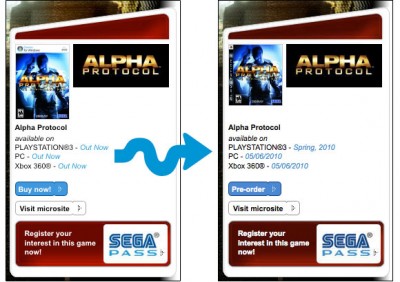Digital Rights Management has been a political minefield for publishers and developers, reviled by consumers and difficult to balance between piracy and fiscal validity. Many companys, like Ubisoft, have tried unique models to mixed success, but Sega’s new system may provide the equality gamers have been clamoring for. Thanks to Game Politics, a spreadsheet of details on the new prototype (to be first implemented on the upcoming Alpha Protocol) can be found after the jump.
- Alpha Protocol uses Uniloc: SoftAnchor.
- Uniloc: SoftAnchor requires an internet connection to activate, though you don’t need to always be connected to play the game, and the web site offers a work-around if you don’t have an internet connection on the PC you install it on.
- The PC version of Alpha Protocol uses an internet based licensing system, where, after installation, the user is required to enter a product registration code (license key) in order to begin playing the game.
- You do not have to have the disc in your drive to play the game.
- The game does not use SteamWorks, and the Steam version of the game will use Uniloc DRM.
- The game can be installed on up to 5 different computers at any one time using the license key the game comes with.
- There is a limit to the number of computers you can use Alpha Protocol on at any one time, but Sega says that the company is not restricting the number of computers you can install the game on over the life of the product.
- Sega will provide a version of the game without DRM using a future patch that it expects to make available 18-24 months after the game’s release.


How messed up is it that PC gamers have accepted so much absurdly restrictive copy prevention that a site like this can now, with a straight face, tout mandatory Internet activation as providing “the equality gamers have been clamoring for”? Will Ubisoft’s retarded constant-connection scheme be regarded as what gamers have been clamoring for after another few years of escalation in the piracy arms race?
Piracy provides the equality gamers have been clamoring for. Paying for the genuine article gets you an inferior product in this day and age. If I had a Windows machine for gaming purposes, it sure as hell wouldn’t be on the Internet, so I wouldn’t be playing this game legally.
The knee-jerk response would be to deride me as a pirate, but I have no machines running Windows at all and my current consoles, a Wii and a PS2, are unmodded with a 14 gallon bin full of lawfully purchased games. I’ve even been screwed by Nintendo for buying a few hundred bucks worth of Wiiware games and then buying a new Wii when my first one died out of warranty, speaking of stupid copy prevention tricks.
I agree with you, DRM is what is really killing PC versions of games, that and crappy ports. PC gaming is not irrelevant, but I seriously think that some companies are thinking that it is so they try their best to sabotage the platform.
At least EA has seemingly given up to a large extend. Last I checked, Mass Effect 2 didn’t do so bad on the PC. It was great to install and play Dragon Age: Origins and Mass Effect 2 without any issues. Unless a revolutionary breakthrough takes place, current DRM such as this is a waist of resources.
That said, the system of unlocking Alpha Protocol sounds a lot like what’s used for many music software programs.
I’m just glad game companies haven’t started asking PC gamers to use a dongle to play their games.
Well it is definitely better than Ubisoft’s one. Also, I don’t really see any difference than EA’s DRM with Spore or a few other companies and their DRM schemes.
I really wish it was like back in the old days when you bought a game and it was yours and free to do as you pleased with it.